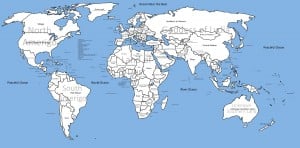The origins of country names
I found this fascinating map on my favorite news aggregator site Reddit. It details how the names of countries came into being by literally translating their names from the original languages of their founders, and has quite a few surprising entries.
Click the small image below to get the full size version – watch out, it’s big! (4500×2234)
Some of the more interesting country and continent name etymologies include “land of dust” for Africa, “village” for Canada, “abundance of butterflies” for Panama, “Where the land ends” for Chile, “isle of shrewmice” for Spain, “place of many trees” for Guatemala, and several countries in Africa all named after words for “black” or “blacks”.
There are a few less surprising origins, for example “new sea land” for “New Zealand”, and “central nation” for China (since China was originally many separate countries before they united in 221BC under Qin Shi Huang).
Being an avid watcher of the ‘fact’-debunking show QI, I’m not entirely sure about America’s origin. A popular theory is that America was named after Amerigo Vespucci, an Italian explorer and cartographer. However, when places are named after people, it’s usually the surname that is used, not first names, so it seems more unlikely that “Amerigo” became “America”. It’s more likely (in my rather uneducated opinion) that the name America came from the Welshman Richard Amerike, a rich merchant who sponsored many sea voyages to North America when it was being discovered. However, I suppose nobody really knows, which is somewhat surprising considering how young our country is compared with so many others.

